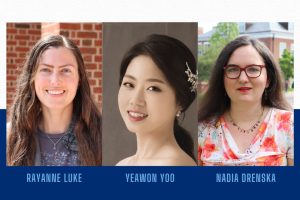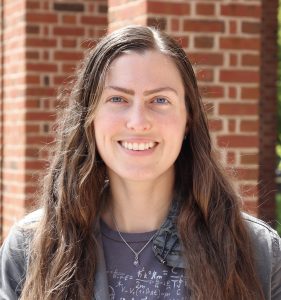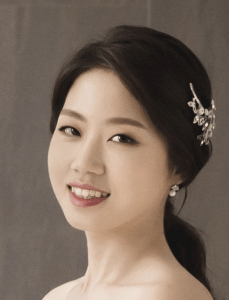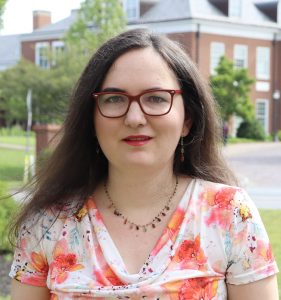
The department is proud to have hosted three exceptional post-doctoral fellows now moving on to tenure-track positions at other universities. Each has made valuable contributions to the department and, during brief Q&A sessions, discussed their time at Johns Hopkins and their future goals, as well as offered advice to other young researchers.
Rayanne Luke is a mathematical biologist with a focus on medical applications. Her research involves probabilistic and  deterministic modeling, optimization, optimal decision theory, and sensitivity analyses, often in collaboration with other disciplines. She received her BS in Applied Mathematics from SUNY Geneseo and her PhD in Applied Mathematics from the University of Delaware, where she used models of human tear film to analyze data from videos to determine parameters with clinical relevance. As a postdoctoral fellow at JHU and the National Institute of Standards and Technology (NIST), she worked on prevalence estimation and optimal classification problems related to COVID-19. In her free time, she enjoys competitive running.
deterministic modeling, optimization, optimal decision theory, and sensitivity analyses, often in collaboration with other disciplines. She received her BS in Applied Mathematics from SUNY Geneseo and her PhD in Applied Mathematics from the University of Delaware, where she used models of human tear film to analyze data from videos to determine parameters with clinical relevance. As a postdoctoral fellow at JHU and the National Institute of Standards and Technology (NIST), she worked on prevalence estimation and optimal classification problems related to COVID-19. In her free time, she enjoys competitive running.
Please share the key finding from your research at JHU.
I solved the multiclass diagnostic classification problem in the most general framework, which was previously unresolved. This means that COVID-19 antibody measurements from vaccinated individuals can now be distinguished from previously infected and naïve samples. My work was the first to obtain unbiased predictions of the relative fractions of these three groups in a population, which are only improved as more samples are added. In another work, I showed that high-dimensional mathematical modeling is a powerful tool for classification, as adding dimensions can improve data separation, reduce the number of samples held out from an analysis as inconclusive, and ultimately increase classification accuracy.
How have your career plans evolved since joining the department? What are your short-term and long-term career goals?
This position reaffirmed my preference for academia. In the short term, I plan to continue my work in tear film modeling and parameter estimation as well as in multiclass classification problems. In the long term, I hope to build a research career with a tangible effect, such as creating mathematical tools that can be used in-clinic.
What advice would you give to future postdoctoral fellows working in this department?
I would encourage making connections outside of the department and consider taking a turn at organizing the post-doctoral seminars as a valuable professional development experience.
What’s next?
I am spending the summer as a National Research Council Postdoctoral Associate at NIST before starting a tenure-track assistant professorship in the Department of Mathematical Sciences at George Mason University in August.
Yeawon Yoo is a mathematician jointly affiliated with the Department of Applied Mathematics and Statistics and the SNF Agora  Institute at Johns Hopkins University and has worked at the interface of data science and democracy. During her time as a post-doc, she proposed a new methodological framework for clustering nonprofit organizations based on their problem spaces using large-scale, publicly available digital data. This work expands beyond existing text-based approaches by using both text—derived both from IRS 990 submissions and organizational websites—as well as numerical and categorical data collected about non-profits to cluster organizations. With a PhD in Industrial Engineering from Arizona State University and a BS in Industrial and Management Engineering from Pohang University of Science and Technology in South Korea, she says she is passionate about research, teaching, and bridging the gap between theory and practice. In her free time, Yoo enjoys listening to music and podcasts for inspiration and relaxation.
Institute at Johns Hopkins University and has worked at the interface of data science and democracy. During her time as a post-doc, she proposed a new methodological framework for clustering nonprofit organizations based on their problem spaces using large-scale, publicly available digital data. This work expands beyond existing text-based approaches by using both text—derived both from IRS 990 submissions and organizational websites—as well as numerical and categorical data collected about non-profits to cluster organizations. With a PhD in Industrial Engineering from Arizona State University and a BS in Industrial and Management Engineering from Pohang University of Science and Technology in South Korea, she says she is passionate about research, teaching, and bridging the gap between theory and practice. In her free time, Yoo enjoys listening to music and podcasts for inspiration and relaxation.
Please share the key finding from your research at JHU.
I have been involved in developing a novel methodological framework for clustering nonprofit organizations. This research aims to utilize large-scale, publicly available digital data to effectively categorize nonprofits based on their distinct problem spaces. To achieve this, we leverage text information derived from IRS 990 submissions and organizational websites, as well as incorporate numerical and categorical data collected about nonprofit organizations. By integrating multiple data types, we can obtain a more comprehensive understanding of the organizations under study. In addition, my research introduces a pioneering approach that integrates data with connection information obtained from a social networking site. By considering both the activities of nonprofit organizations and their relational dynamics, this approach offers a more holistic view of the sector, capturing both what organizations do and how they interact with one another. This expanded perspective enhances our ability to visualize and study nonprofit sectors in a more nuanced and insightful manner.
How have your career plans evolved since joining the department? What are your short-term and long-term career goals?
Since joining the department, my career outlook has evolved significantly. I have developed into an independent scholar and an educator. The experience has shaped my perspective on the multifaceted nature of academia and the importance of being well-rounded in both research and teaching. Looking forward, I am eager to continue refining my teaching skills, mentoring students, and fostering an environment of intellectual curiosity and critical thinking. Additionally, I aim to build upon my research portfolio, exploring new avenues of inquiry and collaborating with colleagues in related fields. In the long term, I aspire to be committed to engaging in community outreach and leveraging my expertise to address societal challenges and make a positive difference beyond the confines of academia.
What advice would you give to future postdoctoral fellows working in this department?
I encourage future postdoctoral fellows to be proactive in seeking out opportunities for collaboration within the department and beyond. Also, I want future postdoctoral fellows to maintain a balance between their research pursuits and personal well-being by taking time to recharge, engage in self-care activities, and by seeking mentorship and support when needed.
What’s next?
I will be starting a new chapter in my career as a tenure-track assistant professor at California State University Channel Islands’ Martin V. Smith School of Business and Economics, beginning this fall.
Nadia Drenska is an applied mathematician whose research involves using partial differential equations, optimal control theory,  and graph theory to analyze machine learning and investment algorithms and to provide give rigorous performance guarantees. As
and graph theory to analyze machine learning and investment algorithms and to provide give rigorous performance guarantees. As
a Rufus Isaacs Postdoctoral Fellow, she has primarily focused on three areas during her time at Hopkins: making predictions with the help of experts, using partially labeled data for learning, and exploring the field of robo-advising, which involves applying mathematical techniques to financial advice. Originally from Bulgaria, she earned her BSc Mathematics Honors and BSc Applied Mathematics Honors from Brown University before earning her PhD from the Courant Institute of Mathematical Science at New York University. In her free time, she enjoys playing bridge, watching baseball, and playing board games.
Please share the key finding from your research at JHU.
I worked on a financial mathematics problem, involving investments through ‘robo-advisors’ (automated investment algorithms.) I found a nearly optimal investment strategy for this model, using ideas from partial differential equations, optimal control, and probability.
How have your career plans evolved since joining the department? What are your short-term and long-term career goals?
Being a postdoc in the Department of Applied Mathematics and Statistics has prepared me for a tenure-track position.
What advice would you give to future postdoctoral fellows working in this department?
I would highly recommend attending the postdoc seminar; it provides a great opportunity to be exposed to cutting-edge math. Moreover, we’ve had discussions on career opportunities, grant writing, etc.
What’s next?
I am excited to be starting a tenure– track job in the Department of Mathematics at Louisiana State University!